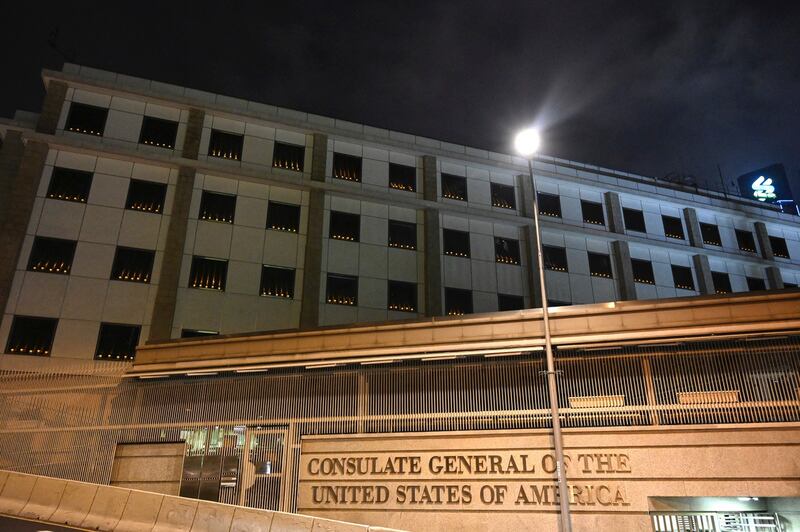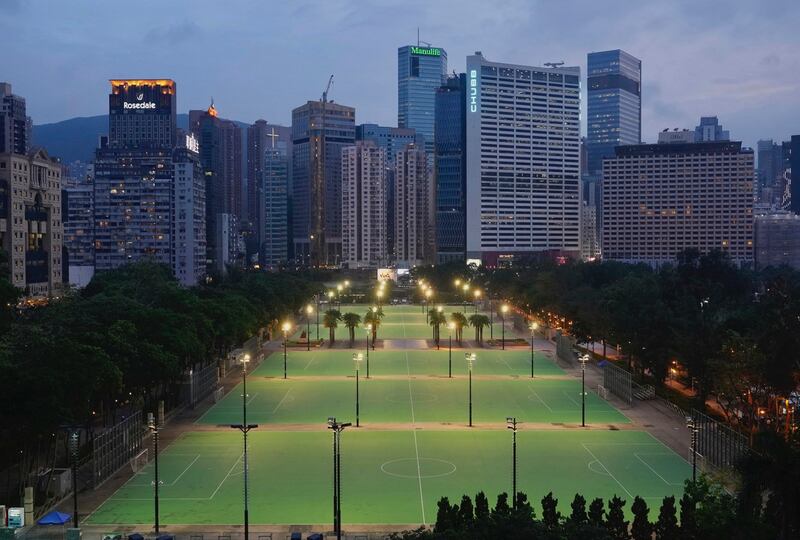Hundreds of people gathered in Hong Kong near the site of a banned candlelight vigil on Friday, lighting up their phone flashlights as thousands of police turned out to guard the area and prevent anyone from getting through.
Without talking to each other, the bystanders lit up their phones at around 8.00 p.m. outside the closed gates of Victoria park, at the time when the banned vigil marking the 32nd anniversary of the Tiananmen massacre would have begun.
The authorities had earlier warned that anyone wearing black, carrying flowers or candles, or chanting slogans could be deemed to have broken the ban, which the government claimed was issued under COVID-19 restrictions for the second year running.
The silent gathering came as mourners and activists outside China marked the anniversary of the bloody crackdown by China's People's Liberation Army (PLA) that ended weeks of peaceful, student-led mass protests on Tiananmen Square.
At least 200 deaths have been documented in the three decades since the massacre, but a large-scale cover-up and official silence over the killings has meant the true toll has yet to come to light.
Until 2020, Hong Kong was the last city on Chinese soil to mark the event, with regular vigils in Victoria Park attended by thousands of people.
Candles were lit in multiple windows of the buildings housing the United States consulate and European Union office in Hong Kong.
During a Mass for the Dead held on Friday, outspoken bishop emeritus Cardinal Joseph Zen called on the ruling Chinese Communist Party (CCP) to face up to the wrongs done to its people in 1989.
"It has been 32 years, and they are still not listening to the voice of the people," Zen said during his sermon, given to a full-capacity church.
"Do those in power still think that it was justified to kill unarmed young people full of love for their country, for the so-called bigger picture?" he said.
"If so, then the tragedy of June 4, 1989 isn't going to fade from our minds; on the contrary. It is more likely to come into sharper and sharper focus," Zen said.

'Insecure and helpless'
A man who attended the mass who gave only a surname, Wong, said he had attended the vigils in Victoria Park for the past 30 years.
"They are so insecure and helpless that they daren't listen to the voice of the people," Wong told RFA. "They can't even tolerate the smallest dissenting voice."
"I don't think this is issue is going to fade away ... Hongkongers were witnesses to that history," he said. "I don't think we're going to forget."
Another churchgoer said many had turned up at mass because there was nowhere else to commemorate those who died now.
"If people aren't allowed to go to Victoria Park, they will go to other places to commemorate this in future," the churchgoer said.
"Facts are facts and can't be faked: history is history, and can't be changed."
The mass came after police arrested Chow Hang-tung, chairperson of the Hong Kong Alliance in Support of Patriotic Democratic Movements of China, accusing her of having encouraged people to attend the banned vigil.
Chow had told RFA that she had planned to go to Victoria Park and light a candle as an individual.
Meanwhile, students at the University of Hong Kong gave an annual cleaning to a sculpture commemorating the crackdown titled the Pillar of Shame.
Seven Catholic churches in Hong Kong offered a mass for the dead on Friday, while several Protestant organizations held prayer and meditation meetings to honor those who died.

Remembrance is a crime
The U.S.-based group Human Rights in China (HRIC) said Beijing had brought an "iron fist" down on Hong Kong since imposing a draconian national security law on the city from July 1, 2020.
Since then, police have arrested scores of pro-democracy activists, including eminent barristers and many former lawmakers, have chilled, criminalized, and punished the exercise of fundamental rights and political participation, the group said in a statement.
The expanding crackdown has curtailed freedom of expression and freedom of the press, while new educational guidelines have been put in place to instill students’ loyalty to the mainland government and curb critical thought, while an electoral overhaul have eviscerated all political opposition, it said.
"In lockstep with the total ban of any public commemoration of June 4th victims and censorship of the topic in mainland China, the Hong Kong police have made remembrance a crime by threatening potential attendees with a jail sentence up to five years," it said.
Yaqiu Wang, China researcher at the New York-based Human Rights Watch (HRW), said the ban on the vigil "speaks volumes" about Beijing's human rights record.
"Thirty-two years after the Tiananmen Massacre, they have only deepened repression ... but suppressing the truth has only fueled demands for justice and accountability," she said.
On May 31, police arrested prominent activist Alexandra Wong, also known as Grandma Wong, 65, on suspicion of "illegal assembly" after she staged a lone protest against the massacre, HRW said in a statement.
Another protester was fined HK$5,000 (US$645) for handing out electric candles and matchboxes marked “never surrender” to mark the event, the group reported.

Reported by Lu Xi and Gigi Lee for RFA's Mandarin and Cantonese Services. Translated and edited by Luisetta Mudie.
